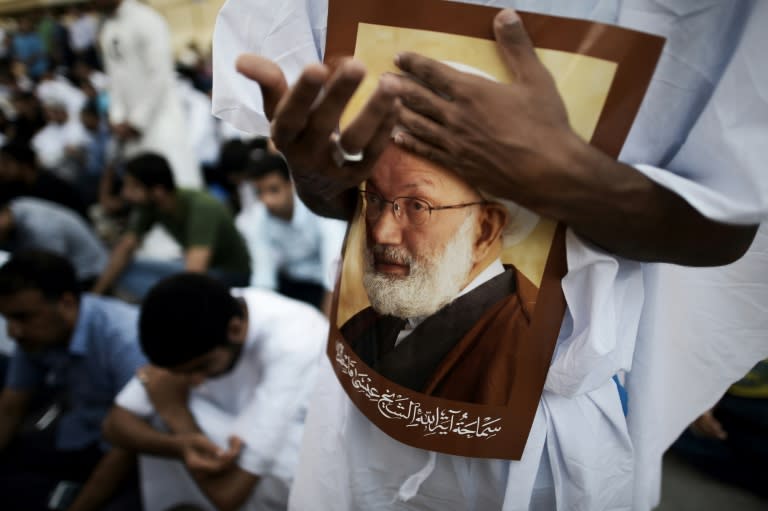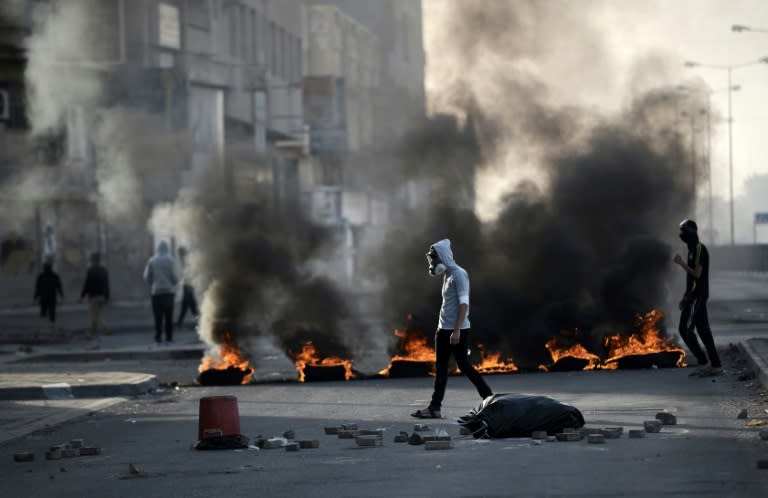Bahrain police fire on Shiite protest, one reported dead
Bahraini police opened fire Tuesday on a protest by supporters of a top Shiite cleric, with at least one demonstrator reported dead in the latest unrest to hit the Sunni-ruled Gulf state. The Britain-based Bahrain Institute for Rights and Democracy (BIRD) announced the "tragic death of a peaceful protester in the crackdown" in Diraz, the scene of a long-running sit-in outside the home of cleric Isa Qassim. Eyewitnesses told AFP multiple civilians were wounded when police opened fire at demonstrators throwing stones and Molotov cocktails at security forces. Police arrested 50 "fugitives", including prison escapees "convicted over terrorism" charges, the interior ministry said. It said some of those detained had taken refuge in Qassim's house and other homes in the area. Several members of the security forces were injured, it said in a statement, which did not mention anyone killed. Pictures posted on Twitter by opposition groups showed demonstrations that purportedly broke out in nearby Shiite villages protesting the crackdown in Diraz. Qassim is considered the spiritual leader of Bahrain's majority Shiite community. The kingdom has been rocked by unrest since 2011, when local authorities backed by a Saudi military force crushed Shiite-led protests demanding a constitutional monarchy and an elected prime minister. Authorities have accused Qassim, sentenced Sunday to a suspended one-year jail term for illegal fundraising and money laundering, of serving "foreign interests" and promoting "sectarianism and violence". A court last year stripped him of his citizenship, sparking repeated sit-ins outside his residence in Diraz. The interior ministry said earlier Tuesday it had "launched a security operation in the village of Diraz to preserve security and civil order as the site is a safe haven for fugitives." Bahraini authorities have accused Iran of fomenting unrest in the kingdom, ruled for more than two centuries by the Sunni Al-Khalifa dynasty. Tehran has consistently denied involvement. The government's clampdown on dissent has drawn harsh condemnation from international rights groups and governments. - US policy shift - The tiny Gulf state is a key regional ally of the United States and is home to its Fifth Fleet, but the administration of former president Barack Obama frequently scolded Manama over rights concerns. In a meeting with Bahrain's King Hamad in Saudi Arabia at the weekend, US President Donald Trump made a clear break from previous US policy. Trump told the king on Sunday it was "a great honour to be with you" and said there "has been a little strain but there won't be strain with this administration". BIRD said Tuesday Trump had "effectively (given) King Hamad a blank cheque to continue the repression of his people". It said the US had "blood on its hands" for supplying arms to Bahrain despite what it called an "intensified repressive campaign on civil society in Bahrain". Brian Dooley of US-based Human Rights First said: "The Trump administration has lifted human rights ties imposed by the Obama administration on the sales of F-16s to Bahrain, and it appears that the regime is taking Trump's message as a signal to intensify its repression without fear of censure." Dooley described the raid on protesters as "deeply disturbing", urging security forces "not to attack peaceful protestors". Manama has imprisoned dozens of Shiites accused of taking part in demonstrations and stripped at least 316 Bahrainis of their nationality since 2012, according to Amnesty International. BIRD says Manama has escalated its repression since mid-2016. A court last year ordered the dissolution of the kingdom's main opposition group Al-Wefaq after authorities accused it of "harbouring terrorism". An 18-year-old Bahraini died in March, nearly two months after he was shot in the head fleeing a raid on Qassim's house, Amnesty said. Bahrain's parliament in March voted unanimously to grant military courts the right to try civilians charged with any act of "terrorism". Rights activists fear Qassim could be among the first to face court-martial.




